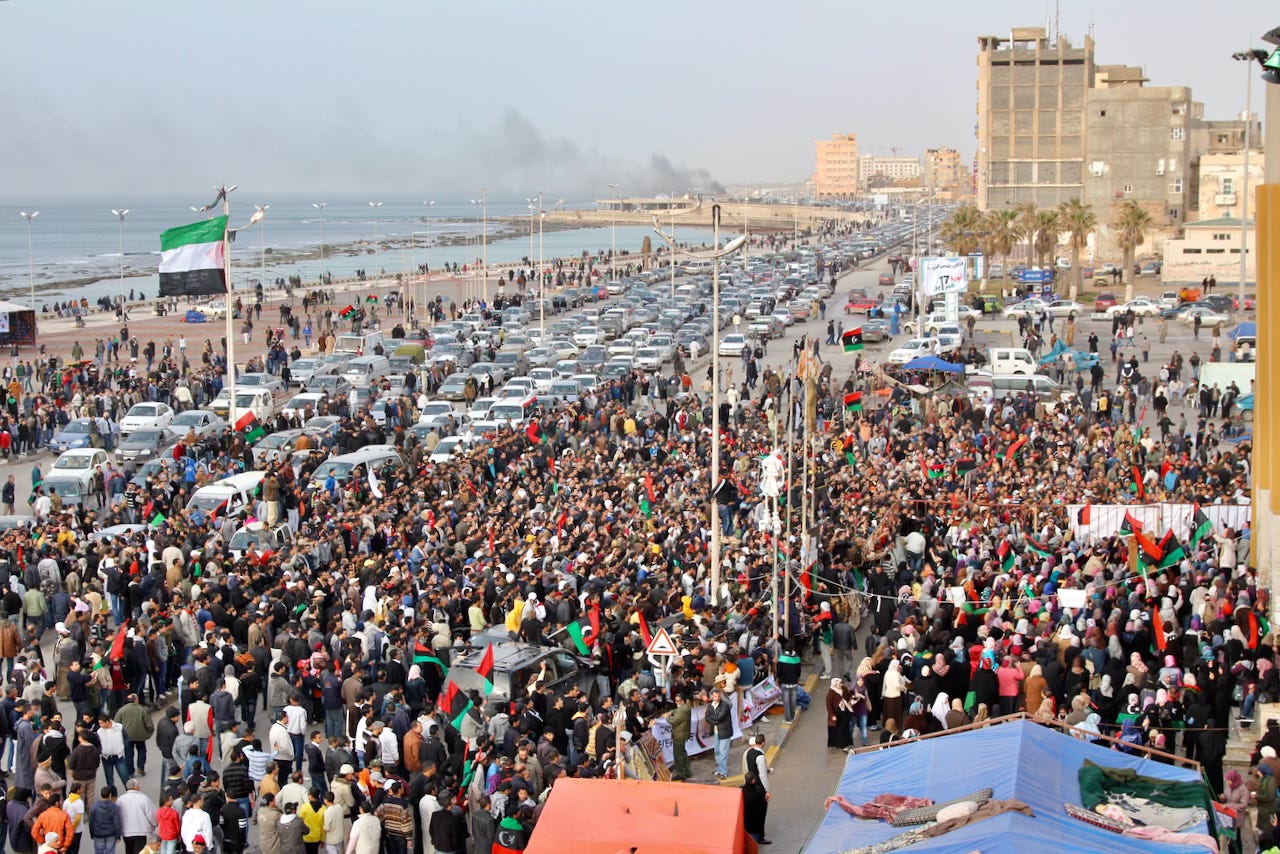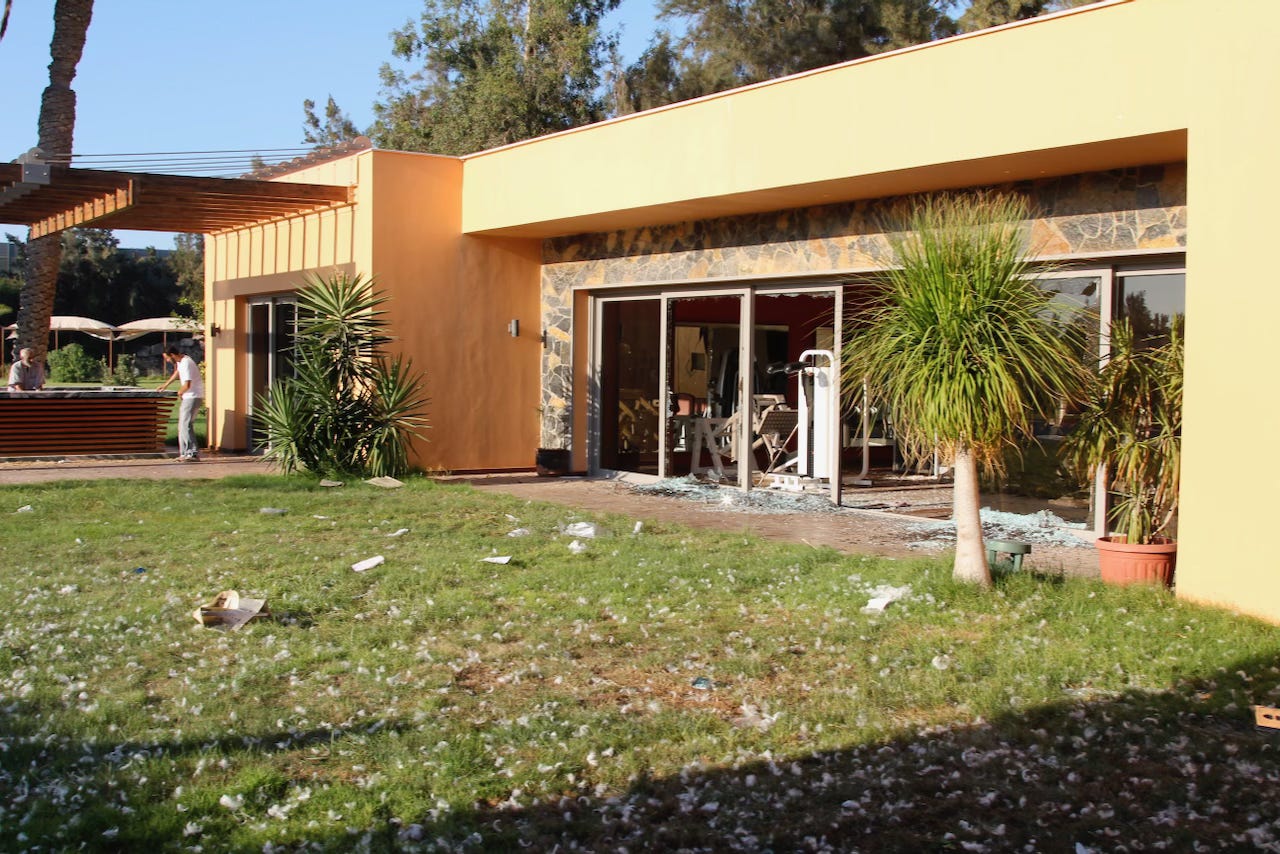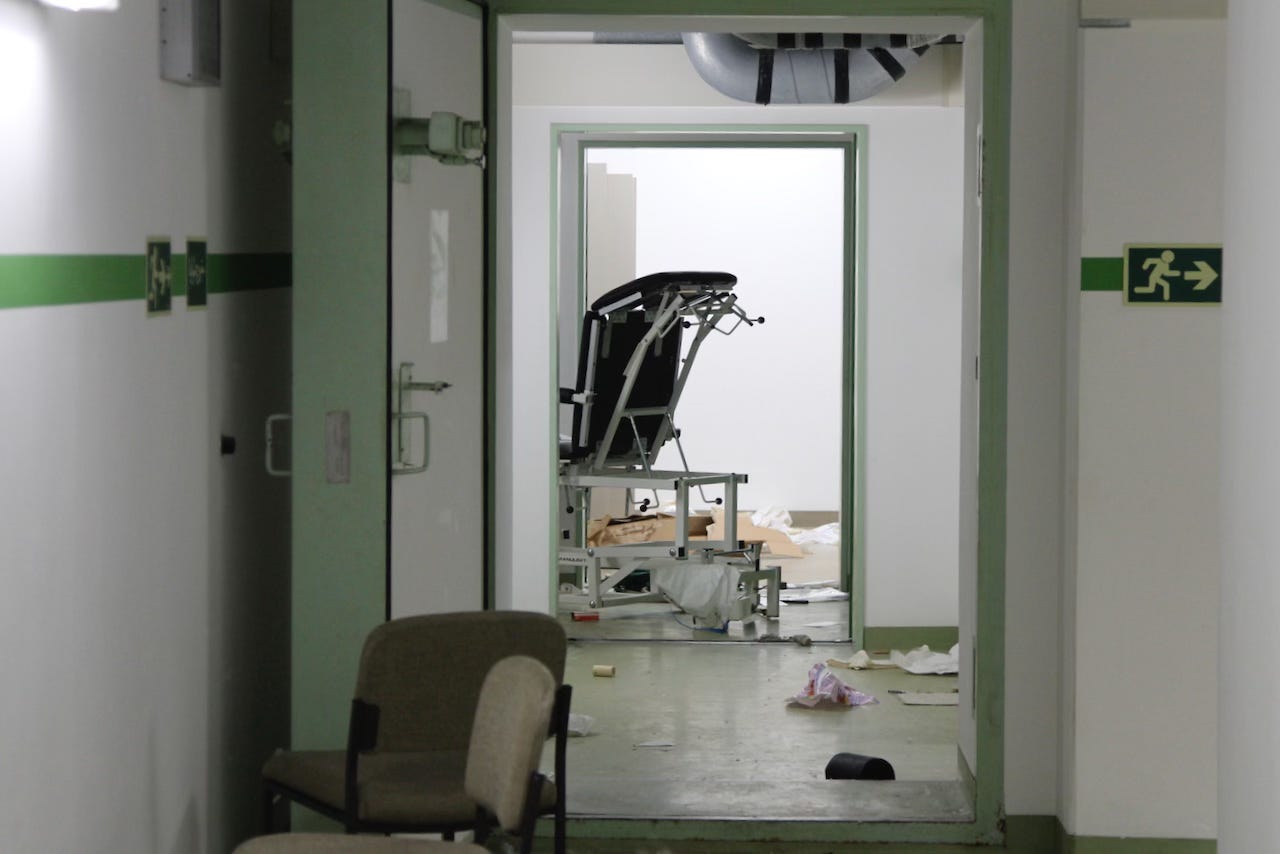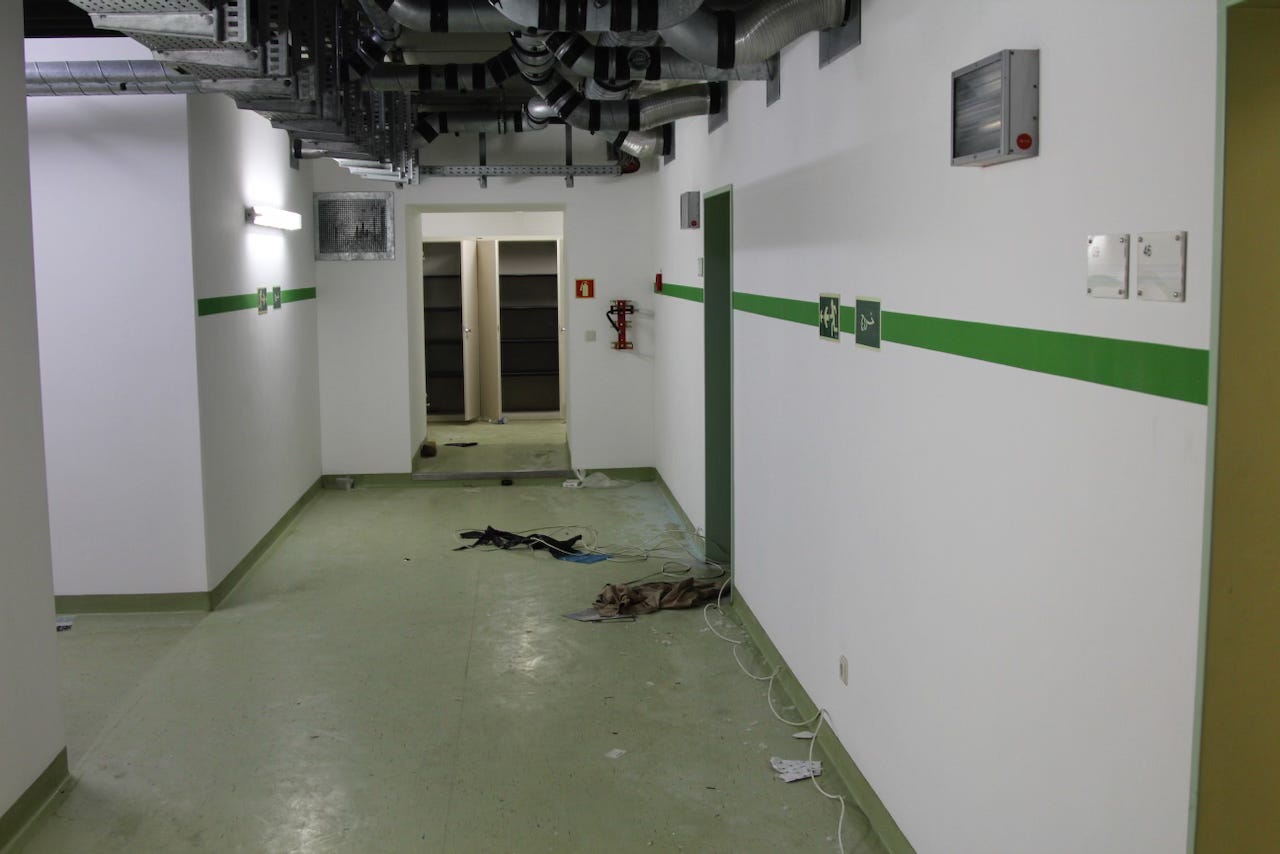The Reporting Playbook from Libya to Syria
When a regime falls, there is a method to covering the madness
By now you’ve likely seen images from Syria ranging from elated citizens celebrating the fall of one of the most heinous and sadistic regimes in the modern era to the horrifying images inside the regime prisons. Citizen and professional journalists have been flooding into former regime territory chronicling history.
It’s a complex moment with people racing to the streets firing guns in the air and chanting and cheering. Others have been rushing into regime compounds ransacking and looting. Others still have been flocking to cameras and microphones to tell their stories.
Covering the fall of a regime is an overwhelming experience as you seek to capture the range of emotions while processing as a human your own reactions to the joys and horrors of the moment.
There is a well-worn playbook for journalists in such situations. I lived it in Libya in 2011.
Run to the prisons, hospitals, morgues, and regime compounds. The stories are there. Some are stories of survival and perseverance. Some are stories of hope—families looking for loved ones who were regime prisoners. Some are pure tragedy as people find only remains.
In the last couple of days, I have seen every story from the playbook: hospitals, prisons, Assad compounds and bunkers. These stories paint a vivid picture of another brutal regime and the lengths it went through to hold onto power for so long.
While there are few surprises, especially to those of us who covered Libya or other regimes, and who previously reported on Syria and the brutality and sadism of the regime, it’s still jarring and horrifying to see the images and footage.
As awful as the images are, they can’t possibly convey the full horror and gruesomeness. There are smells you don’t ever want to smell. There are physical sensations of walking across debris. There’s just an aura of death and ruin. It’s frightening to see in person what many humans are willing—and in the case of many in Assad’s inner circle gleeful—to do to other people.
There are also comedic moments like seeing people walking out of Qaddafi’s compound carrying old stereo equipment or pushing strollers full of gun cases.
And there are few experiences like climbing over the walls of a regime family member’s compound to roam around and explore the extravagance and eccentricity of their personal lives.
A few days after the fall of Tripoli, a group of us including Lulu Garcia-Navarro, Marie Colvin, and Babak Dehghanpisheh, climbed over the 20-plus-foot gate into Mutasim Gaddafi’s compound. Sadly, it had been heavily picked over before we got there, so there were no Rolexes or sensitive documents left to poach. Inside the house was an armored door to an underground vault, and the Libyan rebels had secured it and would not let us into that part of the compound. We didn’t get an explanation what was down there that they were protecting.
However, across the yard was the entrance to an underground bunker with long hallways connecting bedrooms, offices, and a medical suite. It was impressive construction and clearly designed and built for long-term sheltering if needed. It was surreal.
What was also surreal was speaking with people who were emerging from lives of oppression. In March 2011, I was in Benghazi shortly after the city had fallen to the rebels and people had taken to the streets to celebrate their freedom even though Gaddafi controlled much of the country still.
The following is a scene from my book. It picks up just after a two-day journey from Cairo to Benghazi.
We dropped our bags and caught a ride with a couple of Finnish reporters to the media center to obtain press credentials from the rebels. The media center was across the street from a corniche. Cars were packed up to eight across flooding into the port area. People were coming out to celebrate the liberation of Benghazi and the ongoing successes of the revolution. Thousands of people gathered outside the media center, in the street, and along the corniche. They climbed on abandoned tanks and strolled along as celebratory gunfire and explosions rang out. Celebrants waved pre-Gaddafi flags. Children had flags painted on their faces.
We went up to the roof of the media center building to soak it all in. History was unfolding before our eyes. People had risen and were casting off one of the world’s most reviled dictators. To bear witness to something like that, well, that was my job and why I got in the game. However, it was surreal to see it happening in real time. It was more powerful than watching the South Sudanese registering to vote for their independence, which at the time I thought was one of the biggest moments I had witnessed.
While in the past Libyans were reluctant to speak out or say anything critical of the Gaddafi regime, that had all gone out the window. Libyans were aching to talk to western media. Men and boys would approach us and ask to tell us stories. They would yell “Sura, sura” and ask you to take photos of everything, including them.
One man followed me through the media center for 20 minutes as I was completing my registration process and recording and photographing the sounds and sights. The man could barely contain himself. Once he saw that I was finished recording, he asked if he could tell me a story.
He wanted me to explore the controversial case of the Bulgarian nurses (and a Palestinian doctor) who were convicted of injecting 400 Libyan babies with HIV in a Benghazi hospital.
In 1998, the Libyan government charged the “Benghazi six” with the crime and their case played out over the next 9 years in Libyan courts. They were sentenced to life but transferred to Bulgarian custody and pardoned by the Bulgarian president.
The Libyan gentleman claimed that it was Gaddafi all along who infected the children and that the western media needed to investigate it so the world could put it on Gaddafi’s tab of terrorist offenses and crimes against humanity.
The man said that he could never say anything about it before because he would be arrested at best and killed at worst. He kept talking about how now there was freedom of speech in Libya, and he wanted to talk. I was hoping he was going to hand me some game-changing evidence that would lead to a killer scoop, but he just kept telling me that the media needed to report that Gaddafi had been responsible for the HIV epidemic. To date, there is no concrete explanation for the outbreak.
While I was disappointed that he didn’t have new and salacious details, I realized that wasn’t the story. The story was that he felt it was finally safe to speak out loud and denounce Gaddafi. It was as if the Libyan people were turning away from the shadows on the cave wall and walking out into the light. It was humbling to witness people exercising what Americans take for granted: freedom of speech.
That was the case the whole weekend. People were relishing the ability to talk for the first time in their lives. They would launch into anti-Gaddafi diatribes and list off his crimes against the world and the Libyan people. They would often say something to the effect of, “I could never say this before, but…”
That was the most amazing—and uplifting—aspect of covering fall of the Gaddafi regime. Hearing from people who had lived in fear and were now experiencing a moment of freedom was just moving.
However, there was a dark cloud hovering over all of it, and one that hovers over Syria.
I remember feeling a sense of doom about Libya as the rebels were basking in their glory. It was clear that with the common enemy gone, the rebel factions were eventually going to turn on each other. Despite the Libyan opposition forming a government in waiting ready to take over once Gaddafi fell, there were tribal divisions in the country that would be difficult to contain.
With the proliferation of weapons and the large population of young and amped up men, it was clear the country would devolve into civil war, and the international community was either overly optimistic or simply blind to the dynamics that would lead to years of civil war.
Libya is a cautionary tale for Syria. Iraq is as well. I won’t get into all the history and dynamics here, but Assad used to warn the world that should his regime fall, the aftermath and rise of extremist groups would make post-2003 Iraq look like a cakewalk. It was a scare tactic that worked for years and kept the international community from taking him out.
Many in the Syrian opposition that just prevailed have extremist leanings, some were al Qaeda adherents and allies. Some claim to have renounced those ways. Some people believe them, others do not.
There should be no tears shed for Assad and his family and loyalists. They all deserve the most gruesome fates imaginable and more.
But the road ahead for the Syrian people and the region is fraught. While I hope the various opposition factions have learned from Iraq and Libya that there is nothing to gain by turning on each other, I am not optimistic.
Books make great gifts. Order signed, personalized copies of Passport Stamps for the holidays!





